Defining Training: Working together for dogs — what does training mean to you?

Liz and Mishi, trying out the back-pack.
Photo by Jerry Buffman
Surely, there are many different kinds of training you can do with your dog: Competition training, service training, companion training, to name a few. In my opinion they all hinge on one thing:
A system of communication that balances self-discipline, engagement and freedom among those who agree to the rules and boundaries imposed.
I believe that when a dog's basic needs are being met and training is intoduced in a fair and understandable fashion, that dog will capitalize on the benefits effective communication can offer. The dog's owners will, in turn, experience the richness of connecting with a completely different species and reap the rewards that come with embracing a whole new angle on what it means to be alive!
Because, in today's world, our dogs' ultimate destiny is not for them choose, I find their security and fulfillment worthy of our consideration. The question that I really want to get at is: What does training mean to you?
I invite our readers to comment on this post with responses to this question.
If you think training is a good thing for dogs, tell us why and how training has helped your dog.
Tell us what is most important to you in terms of training your dog, and also what gets put on the back burner.
If you are opposed to training, for whatever reason, let us know your thoughts.
Since I believe that dogs can only succeed when their caretakers are capable of advocating for them successfully, I feel we the people who are responsible and affected by their presence in our lives need to be talking about the issues that arise around them with a cooperative alliance.
Please chime in and express your thoughts. I look forward to reading all your comments, and I plan to gear some future posts toward readers' top concerns.
John Spieser is a professional dog trainer and owner of Dogheart. He can be reached at john@doghearta2.com.


Comments
Go Blue
Wed, Dec 1, 2010 : 9:13 a.m.
When you treat your dog with respect and dignity, stability and continuity, bonding happens. When eye contact is made and just moving your eyes to what you want your dog to do or go occurs, you have succeeded and you become one. Or when one softly spoken word is all it takes for your pet to respond. Words like 'yes,' 'no,' 'please' and 'thank you' actually work. Its all about the 'training' of both owner and pet. Screaming, yanking the lead, hitting - would that work on you - of course not. Why then do so many expect more from a dog than they would of themselves? Just like helping children learn as they grow up.
KathrynHahn
Wed, Dec 1, 2010 : 6:36 a.m.
I have always trained with positive reinforcement. My neighbors probably thought I was nuts for praising my dogs for "going" outside, but now they know "outside go" leads to indoor treats! If they need to be disciplined, a raised voice does the trick. As a result they never give me trouble trimming nails, cleaning teeth, and we are a happier bunch all around for it. I used Brian Kilcommons book "Good Owner, Great Dogs" and techniques when training. Worked great for me.
Woman in Ypsilanti
Tue, Nov 30, 2010 : 12:38 p.m.
Training is a good thing for dogs because it makes them less bothersome to their owners, which in turn makes them more likely to continue having a home. How many dogs are abandoned due to behavioral issues? I have dogs and train them informally. I dont really know a lot about dog training but I know that in order for any kind of training to be successful, consistency is key. This is why my dogs are a bit more annoying to other people than some other dogs because I tend to be most consistent about things which annoy me. For instance, my dogs are really not supposed to jump up on me but since I am not 100% consistent about it, they still do sometimes although only in times of great excitement. Jumping up just doesnt annoy me enough. On the other hand, there are no toilet accidents in the house because I am very consistent about correcting the dogs if I catch them in the act combined with a habit of praising them when going outside. I also dont tolerate any kind of aggression. I make sure they know to come when they are called although they do somehow know when I mean business in that if I am just calling them for no particular reason, they sometimes ignore me but if there is a reason why I need them to come, they sense it and come immediately. What is especially interesting to me is when I train the dogs to do tricks. One of my dogs is ten years old and still cannot shake paws because I just dont care enough about it to keep reinforcing the training. My other dog, on the other hand, learned it in one session and has never forgotten.
KeepingItReal
Tue, Nov 30, 2010 : 10:54 a.m.
Great article and good question! I am a dog owner and my philosophy of training is very simple. I want my pet to respond to basic commands involving house training, interaction in public settings with people and other pets, stay, come and sit. For me, it is not important to show my mastery over my dog by having her to respond to a variety of commands that involves advance training for show purposes. Being a pet owner and lover over the years, I have found that dogs especially are very sensitive to the needs and wishes of their owners and if given proper attention automatically formulate an understanding of what is expected of them. They become excellent pets.